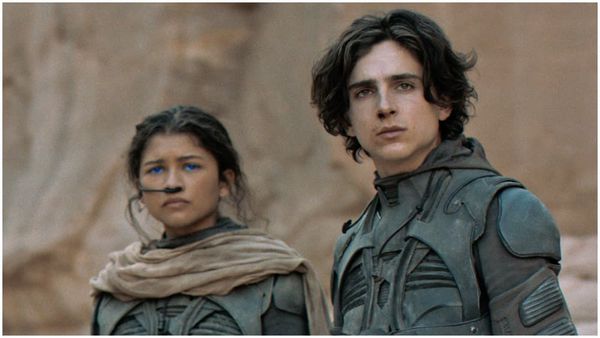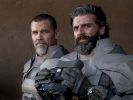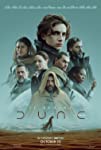Eye For Film >> Movies >> Dune (2021) Film Review
Dune
Reviewed by: Andrew Robertson

Editor's note: because your reaction to this film is likely to depend heavily on how well you know the book, Andrew Robertson wrote a simple review for newcomers and has also written this 'advanced version' for those who want to consider it in depth.

It is a part one, and so it is useful to say how much that part is. The measures are various, not just because this is an adaptation, and one that follows in a long and complex history of adaptations. In review it is hard to balance where we (you and I) sit in terms of responsibility for 'spoilers' and the like but it is made harder in the context of Dune.
Suffice to say that from here on in I am assuming that you have read or seen Dune, and within that I include not just Lynch's 1984 but Jodorowsky's unfilmed and the 2000 miniseries. I will further say that elements that will or did become important in sequel works including 2003's Children Of Dune and the quite complex literary estate may be mentioned. That Brian Herbert is credited as a producer is of note, in a similar situation to the Tolkien estate a child is given responsibility not only as executor but exploration and expansion.
This is your last warning. Here the thump that draws the coming worm.
There are (or will be) 18 additional novels in the cycle, three times the six that Frank wrote. Kevin J Anderson wrote most of these, part of a career that has intersected with film in several places, with novelisations of various works, as well as novels within the Star Wars, Star Trek, DC, X-Files, L Ron Hubbard and other universes. His original work Clockwork Angels is being adapted, and there's a couple of shorts and bits of TV that are from or are his work. Given how much of his writing is 'for hire' it's hard to identify an author of similar stature to Anderson, but he's a creative consultant on this which will inevitably be referred to as Villeneuve's Dune.
Before Villeneuve though was Frank Herbert. I have a copy of it beside me. Page 290 of 464. 510 with the appendixes and the map, a cartography of ideas that includes the Shrine of Leto's skull at Harg Pass and those chapter headings so often from works by the Princess Irulan. I mention her here as much because the film does not - a single reference to the daughters of House Corrino is it - but therein lies a tale of tales.
That copy is the New English Library's 1978 reprint of that 1965 novel. It says "SOON TO BE A MAJOR FILM" on the cover, with an ornithopter that resembles no bird and the blue eyes of a Fremen in the corner. That "major film" is Jodorowsky's, unrealised, but whose legacy is still felt in Alien and beyond. I read it first some time ago. It is my mother's, and that is as well a place to start discussing how and where Villeneuve's is different than source.
Rebecca Ferguson is the Lady Jessica and much of what the novel characterises as her inner turmoil is visible here, notably so. Some credits give her the surname Atreides but in a work where names matter as much this is not right. During the trial of the Gom Jabbar and at other times her worry is palpable, wringing of hands and the Litany against Fear like a further relocation of Shakespeare's Throne Of Blood. The preparations of the Bene Gesserit on Arrakis are recontextualised somewhat, not long planning but a shorter benefit to aid a daughter of the house. There is a vision of her with blue eyes and a tattooed face, a particular child cradled in her hands like a precious knife. In the interview for housekeeper Mapes is introduced to her as Shadout, fate and fait accompli mixed. She is given a crysknife, an ululation of prophecy realised, but in addition to looking much like a kindjal with that pommeled handle and Cossack curve that blade, and that blade alone, is sheathed unblooded.
Oscar Isaac's Leto is the Duke, but fits within the pattern of Paul's father figures. Minimised, at least in this, in order to find room. Jason Momoa's Duncan Idaho, Josh Brolin's Gurney Halleck, Stephen McKinley Henderson's Thufir Hawat and even Javier Bardem's Stilgar are all less than their literary counterparts.
Leto seems to exist to say "desert power", offer a pep-talk to the overtall adolescent Paul. Idaho gets an action sequence that had been a few lines in the book, Halleck gets a bit of comic relief that's in the trailer and, importantly, loses his baliset. Hawat (and David Dastmalchian as Piter de Vries) are Mentats, they might be mentioned as much and we see their eyes roll back in calculation, but never mentioned is the Butlerian Jihad. The Bene Gesserit are mentioned, and in the Harkonnen palace there is a creature with more than four limbs that understands speech that might be a product of the Tleilaxu, but the Ixian efforts may also include holoprojectors and voice recordings.
These simplifications make the length of the film all the more surprising, as so many parts of characters' dualities are removed. Never once is there a mention of the conditioning of Dr Yueh, though Chang Chen still conveys well the balance of loyalties.
The Harkonnens are even less subtle than before - there is outright support from them from the Emperor, the Sarduakar are in their own uniforms! The truthspeaker brings conspiracies multiple and the Emperor is never seen. Nor is CHOAM mentioned, nor the family atomics, there is reference to the Landsraad and to marriage but there isn't mention of kanly or mus or murky and the length of the feud with Giedi Prime isn't discussed. Charlotte Rampling as the Reverend Mother Mohiam has much to do in a variety of meetings but even as Stellan Skarsgård's Baron Vladimar Harkonnen floats above in his suspensor rig the nature of his support from the Empire is more visible than the magics fighting gravity.
De Vries is another of those that do not confront Jessica. While Dave Bautista is his usual solid self as the Beast Rabban his kinder replacement is invisible. Beast a nickname perhaps never discussed, and that again important.
Paul finishes the film with one name. Timothee Chalamet is differently fey and ethereal. Many of the shots make him seem like a construct of the Eighties new wave of popular music, a post-punk prophet. Zendaya as Chani, who watches the duel with Jamis. Paul is no friend of Jamis, sheds no water for him. The way may be shortened but at what cost? He hesitates, but they do not explain it a consequence of training, of tool, not toying and taunting. When Paul is done his mother does not ask how it feels to be a killer. When Paul is done it may not be his first.
They mention the Kwisatz Haderach, the Mahdi, we see sweat beading on the ears of the little mouse that moves 'hop-hop-hop'. We have something different than the novel as a thematically organising metaphor I think, but the struggle with expectation is real. This is Dune, and not in name only, but much of what it signifies is lost. That Paul can see a future and is aware of destiny is a given, even in the first scenes, but as an adaptation I do not believe it can be judged because it is not finished.
The Fremen are in it minimally, described once and shown twice to be fierce fighters. We see them walk without rhythm but it's never described as such. We do not yet have to engage with the possibility of a white saviour narrative because we don't get that far. There's mention of the potential crusade, Paul is seen in golden armour if not upon a golden throne, but it is seen on only one other world, a banner, not bloodshed. The worm looms large but destiny does not seem to loom behind it. We are shown, but not told, and told, but not shown. I do not think as film it succeeds in making clear what the novel does, and that despite the changes wrought by three writers to the work of a fourth.
Villeneuve adapts with Jon Spaights and Eric Roth. None are strangers to science fiction adaptations but the challenges here are various. Not least working together. They have cut and simplified and hewn old words into new configurations. I do not know if in lightening the load they have been able to fit more in but I do know they have not made it faster.
They are never called ornithopters - 'thopter might be short for something else. With sets of two and three and four wings they resemble perhaps dragonflies and damselflies, paleopters in the insect family that cannot fold their wings completely away. It might be short for Clothopter, riding with the guidance of a Fate on the thread of life. They do not resemble birds.
Animals are few, but there are reflections. There are echoes of the worm in the heighliner, echoes of the worm in the sand compactor. These are nicer moments of design where much of the architecture seems influenced more by the real-time-strategy graphics of Westwood's Dune II (1992) and its reliance on concrete than anything textual.
The Spice is vital, but among its properties it is not described as an anagathic. Like glitter from a child's party it is inescapable but its complexities are changed. The harvesters are huge tracked beasts but their lifters appear to be balloons. I am not sure how that works on a desert planet, but perhaps it is an esoteric technology from the before age like hot hydrogen.
As judge of change, Liet Kynes (both names known!) is present when a clamp fails to engage. Poor maintenance, not treachery in the same way. Played by Sharon Duncan-Brewster her role is at once a major and an insignificant change. The planetologist could be anyone, but their role is different now.
That this Dune has minimised the essence of text and tales told, has removed so much of its sense of duality, is reflective of the difficulties of adaptation and of this one. Earlier I said as a part one that it was hard to judge, but on this basis I am not yet convinced. As a film, it has a different burden to carry, but as a new version of an existing work I am as yet unhappy with the finish.
Reviewed on: 21 Oct 2021


















